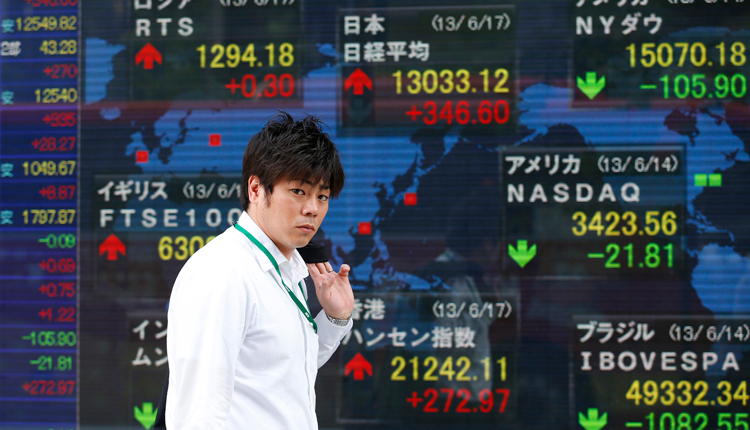Asian markets traded lower Wednesday afternoon amid growing uncertainty over the high-level trade negotiations between the U.S. and China due to commence later this week.
Mainland Chinese stocks declined by the afternoon, with the Shanghai composite down 0.14 percent and Shenzhen component declining 0.54 percent. The Shenzhen composite also slipped 0.347 percent.
Hong Kong’s Hang Seng index shed 0.68 percent as shares of Chinese tech behemoth Tencent dropped 1.24 percent.
The Nikkei 225 in Japan slipped 0.64 percent while the Topix index shed 0.42 percent. In Australia, the S&P/ASX 200 declined 0.7 percent as most of the sectors traded lower.
Overall, the MSCI Asia ex-Japan index shed 0.57 percent.
Markets in South Korea are closed on Wednesday for a holiday.
Apple suppliers fall
Shares of Apple suppliers in Asia largely declined following criticism from Chinese state media on the U.S. tech giant’s decision to allow an app on its app store used by protestors in Hong Kong. The app in question, HKmap.live, tracks the movement of police around the city.
In Japan, shares of Sharp dropped 2.63 percent while Murata Manufacturing rose 0.11 percent.
Sunny Optical shares in Hong Kong plunged 3 percent as AAC Tech also fell 3.26 percent.
Contract manufacturer Pegatron’s stock fell 1.27 percent, as did shares of Taiwan Semiconductor Manufacturing Company, which was down 1.22 percent. iPhone assembler Hon Hai Precision Industry, better known as Foxconn, also dropped 0.81 percent.
Shares of China-based Luxshare and GoerTek fell 5.08% and 4.09%, respectively. Both companies assemble Apple’s AirPods.
U.S.-China tensions
Investors watch for market reaction to overnight developments in U.S.-China tensions. Washington expanded its trade blacklist to include some of China’s top artificial intelligence firms on Monday, in response to Beijing’s alleged treatment of predominantly Muslim ethnic minorities.
For its part, China’s Ministry of Commerce said the U.S. should stop interfering in the country’s internal affairs and remove the relevant entities from the list as soon as possible.
Those latest developments cloud the outlook for the upcoming U.S.-China trade negotiations, set to kick off on Thursday amid the looming prospect of more tariffs from Washington on goods from Beijing.
The White House has scheduled an increase in U.S. tariffs on $250 billion worth of Chinese goods to 30 percent from 25 percent on October 15. U.S. President Donald Trump has said the increase in duties will kick in if no progress is made in bilateral trade negotiations.
“It is clear from just the events of today and recent days that the trade negotiations with China are definitely not getting any closer to resolution. If anything, they’re getting further away,” Carl Tannenbaum, chief economist at Northern Trust, told CNBC’s “Squawk Box” on Wednesday.
“The two sides, even though there are still negotiations scheduled for Thursday of this week in Washington, seem to be taking steps on both sides to distance themselves from one another,” Tannenbaum added.
“In that context, the trade headwind that the economy has been facing around the world is certainly going to remain there if not intensify.”
The protracted trade fight between the U.S. and China has already lasted for more than a year, with both parties slapping tariffs on billions of dollars worth of each other’s goods, denting investor sentiment and raising fears over the outlook for the global economy.
Overnight on Wall Street, stocks tumbled amid the dented hopes for a U.S.-China trade deal. The Dow Jones Industrial Average plunged 313.98 points to close at 26,164.04 while the S&P 500 slipped 1.6 percent to end its trading day stateside 2,893.06.
The Nasdaq Composite dropped 1.7 percent to close at 7,823.78.
Currencies and oil
The U.S. dollar index, which tracks the greenback against a basket of its peers, was at 99.095 after touching highs around the 99.2 handle yesterday.
The Japanese yen traded at 107.15 against the dollar after strengthening from levels above 107.3 in the previous session. The Australian dollar changed hands at $0.6741 after seeing an earlier low of $0.6721.
Oil prices edged lower in the afternoon of Asian trading hours, with international benchmark Brent crude futures slipping 0.34 percent to $58.04 per barrel. U.S. crude futures declined 0.34 percent to $52.45 per barrel.
Source: CNBC


